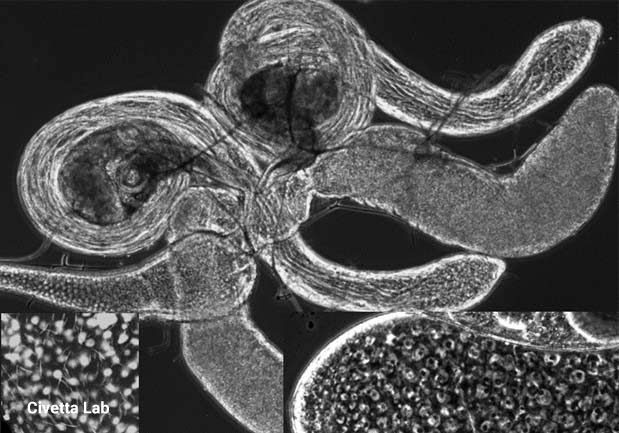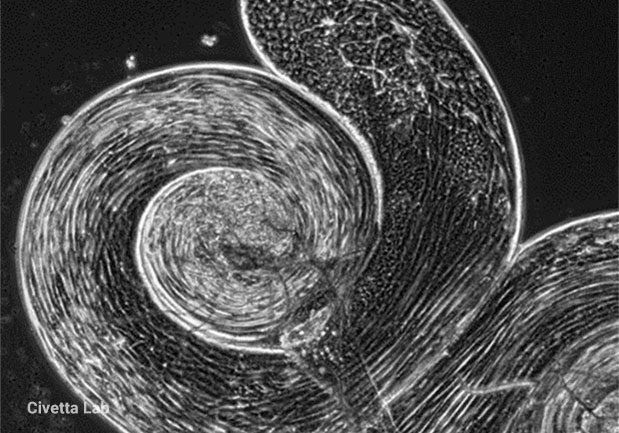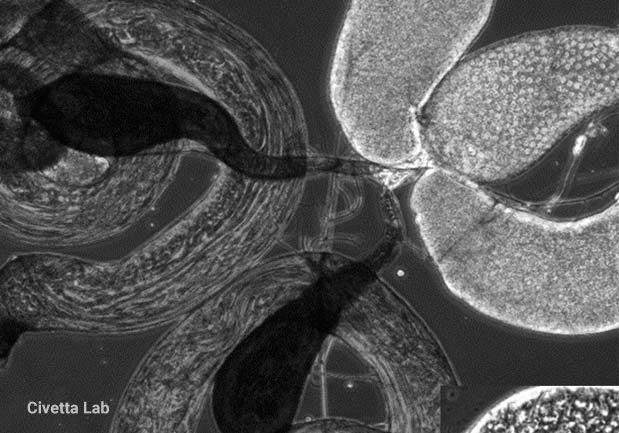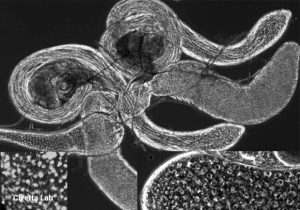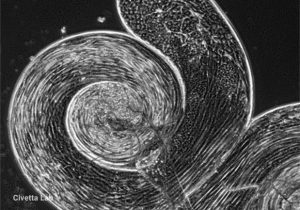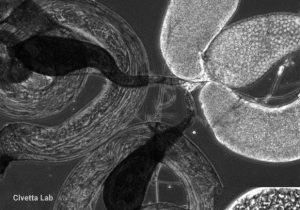PAST EVENTS > OCTOBER 23-27, 2022
The workshop was held at Beit Maiersdorf, The Hebrew University, Mount Scopus, Jerusalem, Israel. All talks were held in Mandel auditorium.
PROGRAM INFORMATION
The Workshop had three distinct, primary purposes/objectives:
A. To facilitate discussion within and between the groups of experts who focus on insect seminal proteins, sperm and pheromones, on female reproductive tracts, nervous systems, and reproductive behavior with the goal of exchanging information, obtaining collegial input from a variety of perspectives and coordinating investigations and collaborations across questions and organisms.
B. To foster interaction between Israeli and non-Israeli scientists in fields including the reproductive control of insects of relevance to agriculture, or reproductive biology in organisms beyond insects.
C. To share the most up-to-date scientific knowledge, to push the frontiers of knowledge and to provide answers/guidance to current and future challenges we face in field of pest control, specifically, for invasive and emerging pests.
The invited speakers covered diverse basic and applied research fields within reproduction, selected for their unique and complementary research angles. The exchange across interdisciplinary borders allows for new overarching ideas to be developed through cross-fertilization of techniques employed and insights harbored by each field.
SCHEDULE OF EVENTS
Click on the dates below to see the timetable for each day
| Until 18:00 | Arrival and check-in at The Maiersdorf Conference Center Hebrew University Mount Scopus |
| 18:15 – 18:30 | Welcome and opening remarks – Yael Heifetz, Mariana Wolfner Mandel Auditorium |
| 18:30 – | Opening Lecture-Inspirational Moderator: Mariana Wolfner & Yael Heifetz |
| 18:35 – 19:50 | Oded Shoseyov, The Hebrew University, IL The Plant Age; Materials for the future |
| 20:00 – | Dinner |
| Morning session – Seminal Proteins and Female Fertility Moderators: Alisa Komsky-Elbaz, Jean-Christophe Billeter | |
| 09:05 – 09:40 | Mariana Wolfner, Cornell University, USA Blurring the line between “male” and “female” contributions to fertility |
| 09:40 – 10:15 | Alberto Civetta, The University of Winnipeg, CA Drosophila seminal fluid genes expression evolution |
| 10:15 – 10:50 | Mark Wainwright, Oxford University, UK Regulation of microcarrier form and function in the Drosophila melanogaster male accessory gland |
| 10:50 – 11:20 | Coffee / Tea Break |
| 11:20 – 11:55 | Yael Heifetz, The Hebrew University of Jerusalem, IL Extracellular vesicles at the site of sperm storage: a new paradigm in insect female fertility |
| 11:55 – 12:10 | Catalina Alfonso-Parra, Universidad de Antioquia and Instituto Colombiano de Medicina Tropical, CO Tissue-specific localization of seminal fluid proteins in the Aedes aegypti female reproductive tract |
| 12:10 – 12:45 | Ryusuke Niwa, University of Tsukuba, JP Circulating fructose regulates a germline stem cell increase via gustatory receptor-mediated gut hormone release in mated Drosophila melanogaster |
| 12:45 – 14:45 | Lunch, Posters and Informal Discussions |
| Afternoon session – Mating Behaviors Moderators: Nicolas Doubovetzky, Toshiro Aigaki | |
| 14:45 – 15:20 | Stephen Goodwin, University of Oxford, UK What genetic signatures define sexually dimorphic neuronal cell types? |
| 15:20 – 15:55 | Carolina Rezaval, University of Birmingham, UK To feed or to mate: Conflict mediation in the brain |
| 15:55 – 16:30 | Matthias Soller, University of Birmingham, UK Characterizing the neuronal circuitry directing the sex peptide response |
| 16:30 – 16:45 | Nallasivan Mohanakarthik, University of Birmingham, UK Sex-peptide induces the post-mating response via distinct CNS neuron |
| 17:00 – | Dinner in Even Sapir |
| Morning session I – Pheromones, Physiology Moderators: Nallasivan Mohanakarthik, Matthias Soller | |
| 09:05 – 09:40 | Ferveur Jean-François, Centre des Sciences du Goût et de l’Alimentation (CSGA), FR Plasticity of the emission and perception of the cis-vaccenyl acetate pheromone in Drosophila melanogaster males |
| 09:40 – 9:55 | Enisa Aruçi, The Centre for Taste and Feeding Behavior, FR An Odorant-Binding Protein involved in courtship behavior of Drosophila melanogaster |
| 9:55 – 10:10 | Nicolas Doubovetzky, University of Groningen, NL Drosophila melanogaster females manipulate sperm allocation based on the sensing of pheromones indicative of male quality |
| 10:10 – 10:25 | Maxime Revel, University of Geneva, CH Repression of abd-A expression by CNS-specific 3’UTR elongation of iab-8 lncRNA |
| 10:25 – 10:55 | Coffee / Tea Break |
| Morning session II – Strategies to Control Harmful and Agricultural-Pest Insects, and to Assist Beneficial Insects Moderators: Maxime Revel, Ravi Ram | |
| 10:55 – 11:30 | Alfred Handler, USDA-ARS-CMAVE, USA Strategies to control male fertility in pest insects by genetic manipulation |
| 11:30 – 12:05 | Philippos Papathanos, The Hebrew University of Jerusalem, IL Engineering sex chromosomes for genetic control of insect pest |
| 12:05 – 12:40 | Frank W. Avila, University of Antioquia, CO Infection by the wMel strain of the bacterium Wolbachia alters female post-mating behaviors and physiology in the vector mosquito Aedes aegypti |
| 12:40 – 14:40 | Lunch, Posters and Informal Discussions |
| Afternoon session: Drosophila suzukii – Plasticity is Key to Success Moderators: Alberto Civetta, Mariana Wolfner (zoom session open to all – click here for a link) | |
| 14:40 – 15:15 | Marta Pascual, University of Barcelona, ESP Invasion history of Drosophila suzukii |
| 15:15 – 15:50 | Bregje Wertheim, University of Groningen, NL Seasonal reproductive biology of Drosophila suzukii |
| 15:50 – 16:25 | Nicolas Gompel, Ludwig Maximilian University, DE Sensing texture during Drosophila oviposition |
| 16:25 – 17:00 | Omar Akbari, UC San Diego, USA Engineered population control technologies in the invasive Pest, Drosophila suzukii |
| 17:00 – 17:35 | Michal Sharon-Cohen, Agricultural Research and Development, Central Mountain Region, IL A view from the field- raspberry growers versus spotted wing Drosophila in Israel |
| 17:35 – 18:00 | Discussion |
| 19:00 – | Dinner and social activity |
| Morning session – Behaviors in a Social Context Moderators: Enisa Aruçi, Carolina Rezaval, Frank Avila | |
| 09:05 – 09:40 | Jean-Christophe Billeter, University of Groningen, NL Social dimension of egg-laying behavior in Drosophila melanogaster |
| 09:40 – 10:15 | Tracey Chapman, University of East Anglia, UK Seminal fluid proteins, plasticity and complexity |
| 10:15 – 10:50 | Galit Ophir, Bar-Ilan University, IL Mechanisms shaping the interplay between social interaction and motivation |
| 10:50 – 11:20 | Coffee / Tea Break |
| 11:20 – 11:55 | Young-Joon Kim, Gwangju Institute of Science and Technology, KOR Reproductive functions of a seminal galactoside in Drosophila melanogaster |
| 11:55 – 12:30 | Irem Sepil, University of Oxford, UK Crowded house – how larval development changes ejaculate investment |
| 12:30 – 13:05 | Ravi Ram, Indian Institute of Toxicology Research, IN To ‘ERR’ is human: male infertility and reproductive toxicity in Drosophila |
| 13:05 – 15:05 | Lunch, Poster session and Informal Discussions |
| Afternoon session: Eggs, Sperm, and Evolution Moderators: Michael Belenky, Irem Sepil | |
| 15:05 – 15:40 | Eli Arama, Weizmann Institute, IL The Rise and Fall of a Giant: Structural organization of the Drosophila sperm mitochondria into a giant sphere and its targeted destruction by an egg-derived cell intruder system |
| 15:40 – 16:15 | Toshiro Aigaki, Tokyo Metropolitan University, JP Glucose metabolism during egg activation and early development in Drosophila |
| 16:15 – 16:30 | Alisa Konsky-Elbaz, The Hebrew University, IL A paternal carry-over effect of damaged spermatozoa to the preimplantation embryo transcriptome – a lesson from the bovine |
| 16:30 – 17:00 | Coffee / Tea Break & Final Discussion: Insect reproductive molecules, what is the future? Moderators: Mariana Wolfner, Yael Heifetz |
| 17:00 – | Dinner in Jerusalem |
| 07:00 – | Further discussions and Excursion to The Dead & Living Sea |
SPEAKERS
Omar Akbari
UC San Diego, USA
Nicolas Gompel
Ludwig Maximilian University, Germany
Marta Pascual
University of Barcelona, Spain
Michal Sharon-Cohen
Agricultural Research and Development, Central Mountain Region, Israel
Toshiro Aigaki
Tokyo Metropolitan University, Japan
Frank Avila
Universidad de Antioquia, Colombia
Jean-Christophe Billeter
University of Groningen, Netherlands
Tracey Chapman
University of East Anglia, UK
Alberto Civetta
The University of Winnipeg, Canada
Stephen Goodwin
University of Oxford, UK
Yael Heifetz
The Hebrew University of Jerusalem, Israel
Philippos Papathanos
The Hebrew University of Jerusalem, Israel
Ravi Ram
Indian Institute of Toxicology Research, India
Carolina Rezaval
University of Birmingham, UK
Matthias Soller
University of Birmingham, UK
Stuart Wigby
University of Liverpool, UK
Mariana Wolfner
Cornell University, USA
Eli Arama
Weizmann Institute, Israel
Galit Ophir
Bar-Ilan University, Israel
Jean-François Ferveur
University of Burgundy, France
Alfred Handler
USDA, USA
Bregje Wertheim
University of Groningen, Netherlands
Ryusuke Niwa
University of Tsukuba, Japan
Young-Joon Kim
Gwangju Institute of Science and Technology, South Korea
Irem Sepil
University of Oxford, UK
Mark Wainwright
University of Oxford, UK

